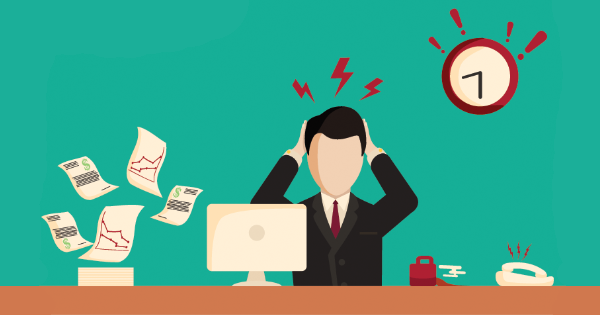
6 Ways to Stress Less at Work
Everyone gets the feeling of being stressed, but when the stress is interfering with your work and productivity, it might be time to address the issue. Stress comes in many forms and it effects people in a variety of different ways. Knowing how to prevent stress, identifying where your stress comes from, and understanding how to cope with it can help put your mind put at ease.
To help with your battle of anxiety and restlessness, here are a few tips on how to prevent and cope with stress:
Take a Deep Breath
When you start feeling overwhelmed after a long meeting or realize you have multiple deadlines approaching, take a few minutes to step back and take a few deep breaths. Simply take a long deep breath in through your nose, hold, and exhale through your mouth in equal counts. Doing this helps slow down your heartbeat, relaxes your muscles, and also helps decrease your blood pressure. Think of it as a mini yoga break at your desk to clear your mind and preserve your focus.
Understand Your Stressors
Knowing your triggers and the source of your stress is a very important part of stress management. A great way of identifying your stressors is to take a moment and write down your top concerns. Once you write down your stressors, you’ll start to notice that some are external (e.g. life events, project deadlines, etc.) while some are internal (e.g. fear, uncertainty, etc.). Recognizing your stressors and identifying what kind of stressor it is the first step in managing your concerns. Some strategies to combat your external stressors include lifestyle changes, asking help from others, and practicing time management while strategies to combat internal stress include using relaxation techniques, challenging your negative thoughts, or talking with a close friend/relative.
Use Your Vacation Time
We are given time off for a reason, so make sure to use it! Taking time away from the office gives us the break we need so we can return refreshed and better equipped to handle whatever life throws our way. Workers who regularly take time off are also less likely to experience burnout, making them more productive and equipped with a better attitude than their stressed out colleagues.
Get an Adequate Amount of Sleep
Getting a good night’s sleep is essential for allowing our brain and body to recharge. In enables us to tackle stress more easily and leave us with a better memory, judgement, and mood. If your routine allows it, try to get the recommended 7 – 9 hours of sleep to help combat your stress levels.
Exercise Regularly
Exercise is a common technique for stress relief and that’s because it works! Exercise produces endorphins (your brain’s feel-good neurotransmitters/hormones), which leads to a better overall mood, increased energy levels, and many health benefits! A person who is fit is better prepared for handling stress while a person with unhealthy habits can lead to other stressors (such as hospital-related health issues), which exercise can help prevent.
Eat Healthy and Balanced Meals
In addition to exercising regularly and getting an adequate amount of sleep, the foods you eat can also play a huge factor in why you are feeling anxious. During times of stress, we often turn to comfort foods that are high in sugar and unhealthy fats. Although these foods give us a temporary burst of energy, they often lead us to feel more sluggish, have a higher blood pressure, and become less able to deal with stress. Instead of turning to your go-to comfort foods, try eating healthier option like fruits, veggies, whole grains, and white meats. These types of food not only give you the healthy nutrients your body needs, but they can also reduce stress by lowering the amount of hormones that trigger stress in the first place.
Although we can’t fully eliminate stress at work and in our lives, we can take the necessary stress to reduce and limit it. What are some of the ways you help reduce stress in your life?

